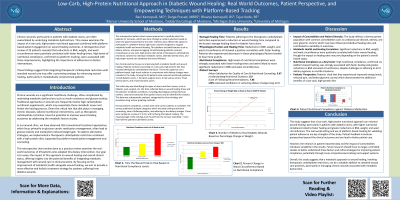Case Series/Study
(CS-069) Low-carb, High-protein Nutritional Approach in Diabetic Wound Healing: Real-world Outcomes, Patient Perspectives, and Empowering Techniques with Platform-based Tracking
Friday, May 2, 2025
7:45 PM - 8:45 PM East Coast USA Time

Durga Prasad Gutta, MBBS; Bhavya Kamepalli, BS Neuroscience; Tejas Kode, BS
Introduction: Chronic wounds, particularly in patients with diabetic ulcers, represent a significant healthcare challenge due to underlying metabolic dysfunctions such as insulin resistance and glucose toxicity. Traditional wound care approaches often overlook the critical role of tailored nutritional interventions in addressing these metabolic barriers. This study explores the impact of a therapeutic carbohydrate restriction diet, high-protein nutritional guidance, and platform-based patient engagement on wound healing outcomes.
Methods: A retrospective review of 29 patients revealed that reductions in BMI, weight, and waist circumference were positively correlated with faster healing times. High levels of nutritional compliance, which were supported by weekly counseling and digital tracking tools, were key contributors to improved outcomes. The study highlights that empowering patients with personalized dietary education and tools to monitor compliance resulted in enhanced wound healing and better metabolic fitness.
Results: Patients adhering to dietary recommendations experienced faster wound healing, with average healing times of 1-3 months. Reductions in BMI (average decrease of 2.5 kg/m²), weight (average loss of 6.3 kg), and waist circumference (average reduction of 7.2 cm) were strongly correlated with faster recovery. Patients reported a mean satisfaction score of 9.67 (on a 10-point scale) for the quality of care and nutritional counseling received. Understanding of nutritional guidance averaged 9.0, while ease of following recommendations averaged 7.86, highlighting the need to address practical challenges like meal preparation and food affordability. Despite these barriers, 85% of patients expressed confidence in sustaining dietary changes long-term, with many citing improved energy levels, reduced pain, and better glycemic control as additional benefits. These numbers are based on surveys submitted by patients, which were more than half the patients.
Discussion: These findings underscore the potential of integrating therapeutic carbohydrate restriction into wound care practices to improve outcomes for metabolically compromised patients. Future studies should explore scalable interventions to address adherence challenges, further validating this holistic approach to wound healing.
Methods: A retrospective review of 29 patients revealed that reductions in BMI, weight, and waist circumference were positively correlated with faster healing times. High levels of nutritional compliance, which were supported by weekly counseling and digital tracking tools, were key contributors to improved outcomes. The study highlights that empowering patients with personalized dietary education and tools to monitor compliance resulted in enhanced wound healing and better metabolic fitness.
Results: Patients adhering to dietary recommendations experienced faster wound healing, with average healing times of 1-3 months. Reductions in BMI (average decrease of 2.5 kg/m²), weight (average loss of 6.3 kg), and waist circumference (average reduction of 7.2 cm) were strongly correlated with faster recovery. Patients reported a mean satisfaction score of 9.67 (on a 10-point scale) for the quality of care and nutritional counseling received. Understanding of nutritional guidance averaged 9.0, while ease of following recommendations averaged 7.86, highlighting the need to address practical challenges like meal preparation and food affordability. Despite these barriers, 85% of patients expressed confidence in sustaining dietary changes long-term, with many citing improved energy levels, reduced pain, and better glycemic control as additional benefits. These numbers are based on surveys submitted by patients, which were more than half the patients.
Discussion: These findings underscore the potential of integrating therapeutic carbohydrate restriction into wound care practices to improve outcomes for metabolically compromised patients. Future studies should explore scalable interventions to address adherence challenges, further validating this holistic approach to wound healing.

.jpg)